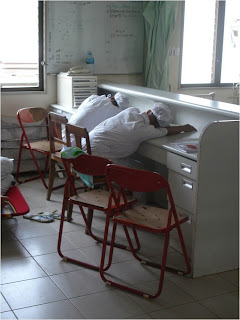The pinnacle of good emergency medicine & post resuscitation care - ICU - my goal!
So I have reached the 6 month mark of my time here (8 months in Cambodia in total) and now is about the time that it is anticipated for volunteers to experience the "6 month dip." If my current mood is anything to go by I think that the 'dip' they refer to is probably born out of an overwhelming sense of futility, bubbling up of 6 months worth of frustration and the dawning realization that volunteerism is not valued or worse still completely worthless.
Now most people (not all) come out the other side of this dip and have long and fulfilled lives in international development but whilst I am in it I think it is probably worth exploring why it happens and what it means about us (as volunteers) and them (the reluctant recipients of our capacity building).
I came to the conclusion that people do not value things that are for free at about exactly the same time that a friend messaged me words of encouragement and support. It was powerfully well timed, his response to my exclamation of futility clarified I think the root of the problem.
He works in Africa and empathized with my experience of not feeling valued by doctors or nurses that we work with. He wisely told me to concentrate on the patients - the small child or parent - who are more likely to see the value of a competent, trained and caring health care professional. It got me thinking, we had worked together in the NHS -universal free health care - how the fact that something is free impacts on it's perceived worth. Patients do not directly pay for their health care in the UK and there is a high expectation of the right to have free health care and often a failure to value or see the true worth of something as precious as the NHS. As a salaried doctor in the NHS, although I believed in a patient centered approach and got much of my job satisfaction from my interactions with patients, many of my feelings of value or worth around my job came from the committed team of hospital staff that I worked with. The patients and relatives were why we were all there but their taxes paid my (overpaid) wages as they often like to remind us and I had to get accustomed to frequently failing to meet their expectations. The dynamics of private health care are of course different, when you are paying directly (not through taxes) for health care you value it more because it has a tangible worth. Having worked in countries where there is not free health care it always frustrates me how undervalued the NHS is and how the better something is the less people seem to appreciate it.
So value & worth - how do you get it? From my limited experience here it would seem that you have to earn lots of money overseas and then come out on short visits only. This way you are seen as a revered expert and very much valued. If you can not speak the language, make no attempt to understand the culture or context and ignore local experts this seems to be even more effective.
Giving up a well paid job to come here for 26 months as a volunteer - well that's just madness and at best deserves sympathy and at worst contempt. My favourite piece of advice was from a colleague who works for my partner NGO - he told me not long into my placement here sincerely and with no malice intended, "Thank you for coming Esther, we really appreciate it, but there is absolutely nothing you can do here."
I sometimes think that if my hospital had to contribute to my living allowance, as they do in other countries, perhaps they would value me a little more. I'm not saying that they would listen to me or even take any of my advice but maybe there would be a sense of ownership and they may even consider letting me into the room. Currently I am left standing out in the rain wondering whether the plans for the new Emergency Room will ever be shared with me or if being a specialist in emergency medicine means anything at all because the moment I gave up my job in the NHS it appears I was rendered completely useless.
And as for the reluctant recipients of my capacity building - they would just like lots of money and resources and not to have their knowledge challenged by training or for me to ask any difficult or awkward questions.
So why do I even need to feel there is a sense of value or worth to what I do? Maybe I'll leave that one as a rhetorical question for you....
| 


Yours is a good point about basing value on what you pay for something. While it is literally true in the sense of financial value, there is something bigger going on. The distinction between private and public health in the UK is an excellent example and this blog from Seth Godin makes the point, in the context of paying for and getting free advice, in a different but equally succinct way.
ReplyDeleteMy NGO partner does make a contribution and this also has its own problems in terms of what type of work they expect from me - the capacity building versus hand-on tension.
Chin up! It'll all work out in the end.
Love the Seth Godin blog - thanks Sam - should have just re-posted his blog, far more eloquent than I could ever be!
ReplyDeleteI'm sure the guys at the hospital follow my blog though, their behaviour always changes accordingly....